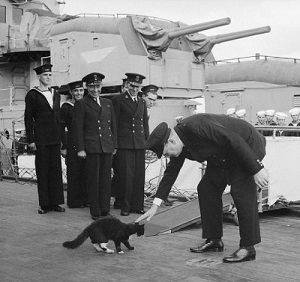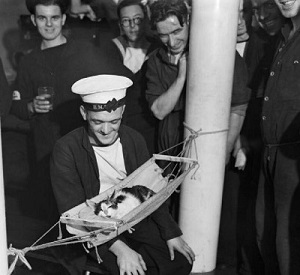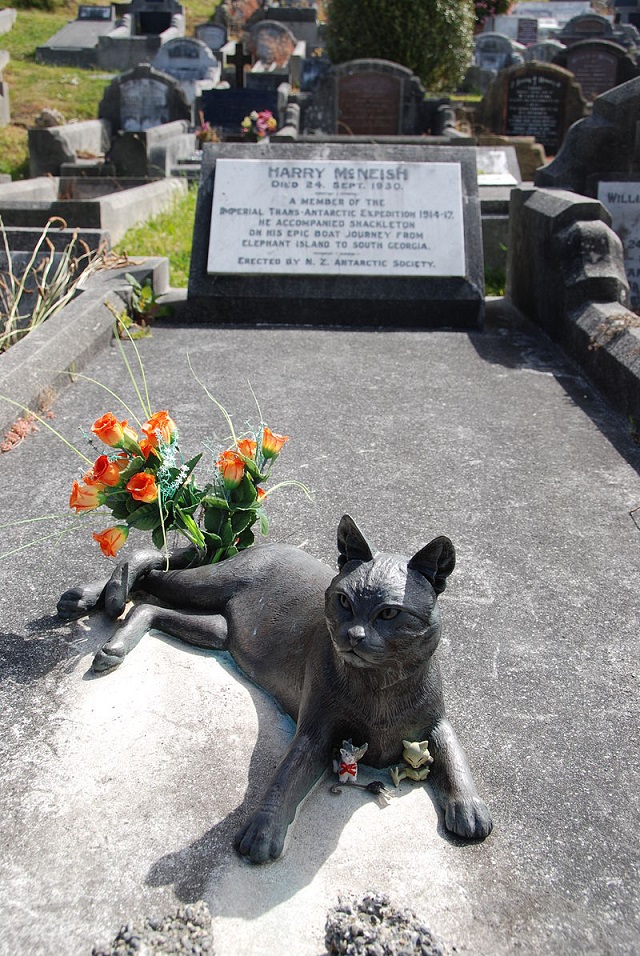A Day for Five Hundred Million Cats
August 8 is International Cat Day, and with an estimated 500 million cats worldwide, they are possibly the most popular pet on the planet.
The ship’s cat dates back to ancient times. Phoenician cargo ships are thought to have brought the first domesticated cats to Europe around 900 BC.
Cats have been carried on ships to catch mice and rats which can cause damage to cargoes, stores, ropes, woodwork and eventually as technology progressed, electrical wiring.
Rodents were also a source of disease. For example, rat fleas are carriers of plague and it is believed rats on ships were one of the main spreaders of the Black Death.
The natural ability of cats to adapt to new surroundings made them suitable for service on a ship. They also offered companionship and a sense of home, security and camaraderie to sailors who could be away from home for long periods, especially in times of war.
.jpg) Unsinkable Sam
Unsinkable Sam
The most famous mascot of the British Royal Navy, Unsinkable Sam, was the ship’s cat on the German battleship Bismarck. When the ship was sunk in 1941, only 116 of the 2,200 crew on board survived. Sam was picked up by the destroyer HMS Cossack, which was torpedoed and sunk a few months later, killing 159 of her crew. Sam survived to become the ship’s cat of HMS Ark Royal. This vessel was torpedoed and sunk a few months later. Sam was rescued again, and lived the remainder of his life ashore.
Unsinkable Sam lived with the governor general of Gibraltar's office for a while before returning to the U.K. to live out his life at the Home for Sailors.
.jpg) Simon
Simon
Simon, the ship’s cat of HMS Amethyst, was wounded during the Yangtze Incident in 1949 that killed 25 crewmembers, including the commanding officer.
Simon recovered. “Simon’s company and expertise as a rat-catcher were invaluable during the months we were held captive,” said Commander Stuart Hett. “During a terrifying time, he helped boost the morale of many young sailors, some of whom had seen their friends killed.”
When Simon later died of an infection, tributes poured in and his obituary appeared in The Times. He was posthumously awarded the Dickin Medal for bravery and was buried with full naval honors.
Blackie (also known as Churchill)
 Blackie was the ship cat for HMS Prince of Wales, a King George V-class battleship of the Royal Navy. The ship was involved in several important actions during World War II.
Blackie was the ship cat for HMS Prince of Wales, a King George V-class battleship of the Royal Navy. The ship was involved in several important actions during World War II.
Blackie achieved celebrity status after Prince of Wales brought Prime Minister Winston Churchill across the Atlantic to Newfoundland for a clandestine meeting for several days with Franklin D. Roosevelt. The result of their secret summit on the ship resulted in the signing of the Atlantic Charter. As Churchill prepared to disembark the Prince of Wales, Blackie went to him for a pat. In honor of the success of the visit, Blackie was renamed Churchill.
Convoy
 Convoy was the beloved cat on board HMS Hermione, named for the multiple times he accompanied the ship on convoy escort duties. Convoy was registered in the ship’s book and was given a full kit, including a hammock to sleep in. He stayed on the ship to the end and was lost along with 87 of his crewmates when the Hermione was torpedoed and sunk in 1942.
Convoy was the beloved cat on board HMS Hermione, named for the multiple times he accompanied the ship on convoy escort duties. Convoy was registered in the ship’s book and was given a full kit, including a hammock to sleep in. He stayed on the ship to the end and was lost along with 87 of his crewmates when the Hermione was torpedoed and sunk in 1942.
Mrs. Chippy
Mrs. Chippy was a tiger-striped tabby taken on board the ill-fated Endurance by Harry McNish, the carpenter nicknamed “Chippy” where she would explore the Arctic expanse with McNish and Sir Ernest Shackleton.
Originally thought to be a female, a month after the ship set sail for Antarctica it was discovered that Mrs. Chippy was a male, but the name stuck - Mrs. Chippy followed McNeish around like a jealous wife.
 After the ice finally consumed the ship, Shackleton decided that Mrs. Chippy and a number of the more than 70 sled dogs had to be put down. Conditions were extreme and supplies were dangerously limited. The crew took the news very badly.
After the ice finally consumed the ship, Shackleton decided that Mrs. Chippy and a number of the more than 70 sled dogs had to be put down. Conditions were extreme and supplies were dangerously limited. The crew took the news very badly.
In 2004, a life-size bronze statue of Mrs. Chippy was placed on the grave of McNish by the New Zealand Antarctic Society in recognition of his efforts on the expedition.
International Cat Day was established in 2002 the International Fund for Animal Welfare and other animal rights groups.

The opinions expressed herein are the author's and not necessarily those of The Maritime Executive.
